
April 2, 2012
 A Few Notes On Emerald City Comicon 2012
A Few Notes On Emerald City Comicon 2012

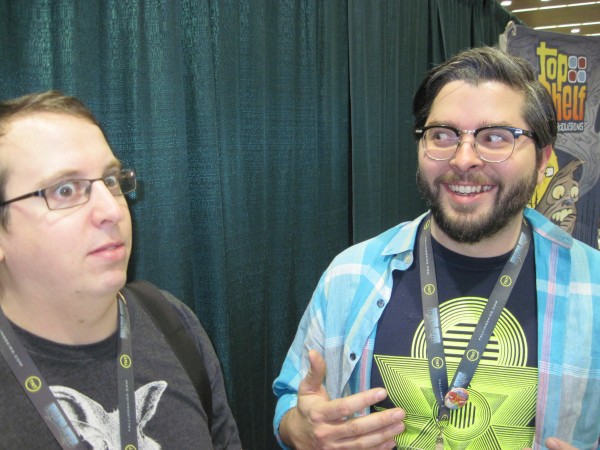
*****
What follows are a few notes and observations from my time spent attending
the Emerald City Comicon in Seattle over this past weekend. I apologize for the obvious super self-indulgent nature of this, but it's been a while since I've been out of the house and I've convinced myself that some people like to mine stories like this for individual moments.
Short form: I really enjoyed the show. It's not really a show for me, but there's stuff in there for me. I think it's a strong mid-major/regional show, growing stronger, and that it should be around for several years. While it takes place in that city's version of Times Square, the city of Seattle remains an overall strength for -- and attraction regarding -- a show like that. I hope it keeps going, because I'd like to go back.
And now the longer version:
* one thing that kept occurring to me in the weeks leading up Emerald City is that despite having lived there for almost a decade I know next to nothing about the nerd culture in Seattle. I have a sense of the
comics culture, but only from the perspective of
having worked at
Fantagraphics. I actually saw more of the
Wizards Of The Coast-driven tabletop gaming culture in Seattle than I did mainstream comics, movies, manga, TV shows and prose during my time there. And I didn't seem much in the way of the tabletop gaming folks.
* Seattle's also an odd city in that while it offers a pretty common split culture-wise between its suburbs and its downtown, a lot of the Seattle suburbs have a big body of water between them and the neighborhoods within the city. So there's a bigger divide than usual between those contributing populations. I point this out because I have to imagine that, say, a comics shop in Renton is different than
Fallout Records or
the Fantagraphics store.
*
I went to Portland first.
* while in Portland, I visited The Bad Apple, a book, comics, film and art store that shares space with
Sparkplug on Portland's southeast side. I met up with former Fantagraphics and current
Studygroup Magazine co-editor Milo George there.
* Bad Apple is a fun store, and you should go if you're ever in Portland. The place reflects the wider cultural tastes of
the late publisher and cartoonist Dylan Williams, and he enjoyed a lot of fascinating material not just limited to comics. I bought something from the well=curated used books section (a
John P. Marquand). There's a lot of nice art for sale there, too, including several pieces by
Chris Cilla and a few super-attractive $100-$300 paintings from
Andrice Arp.
*
seriously, you should go.
*
Emily Nilsson told me that the distribution side of Sparkplug is starting to move forward now, after being put on an acquisition-hiatus following Williams' sickness and passing last year. That's great news. I think it's tough out there right now for anyone that wants to facilitate the sale of objects, even beautiful ones. As many anchors as that part of the comics market can have, the better.
* you should also try to see Sparkplug on the road. As I recall, they're going to
TCAF, and they'll be at the local
Stumptown Comics Fest.
*
the fundraising for Sparkplug's first three books in this new phase of their publishing life continues apace. I think one worry with raising capital this way is that you're basically compensating for a lack of structure that a publisher or an artist wishing to publish might have if they simply made different choices. That's not the case here; I think Sparkplug has a nice set of resources in place and this is just going to be something they try in terms of raising capital. I know that's a fine distinction that a lot of folks might not see, but it's important to me.
* I saw a pair of Portland comics shops. The first was
Cosmic Monkey Comics, which is the kind of store that would have caused me to sit down and weep even just 20 years ago but somehow manages to serve its customers week after without getting a lot of attention as a super-elite store.
*
Zack Soto was closing.
* Cosmic Monkey even has an old-school back-issues room, although it featured more appropriately-priced comics of an admirable, you-nod-knowingly-at-them quality than "holy crap, look what I found for 10 cents" comics. In general, it struck me as being about the size of Chicago Comics' space, a bit bigger with that extra room. I could shop in a place like that every Wednesday for the rest of my life. I was tempted to buy back issues of
King-Cat from a rich minis section, if only on principle.

* I also saw
Floating World. That seems like an ideal modern comics shop in terms of its space (a quirky downtown on-the-corner location with high ceilings and enough room to host parties) and stock (things like issues of
Jack Katz's The First Kingdom out for sale next to the mainstream comics).
* Soto was also working at Floating World when I visited. He swore he worked at only those two shops. It was nice to see Soto, although I'm sure he got sick of me by weekend's end. This is what happens when you take extra time turning in a
CR interview: there's a small chance I come out to where you live and have periodic conversations with you for four days in a row.
* one such conversation: Soto's excited for
CAKE, Chicago's forthcoming show, for the simple but very logical reasons that Chicago should have such a show and that Chicago's reputation as a city with an art scene
and an arts audience (a rarer distinction than you'd think) means there's potential there for a lot of sales in the BCGF way if the show develops this audience over time.
* it's fun to talk shows with comics people, because they've become such an important component of doing business and, obviously, it's a way that comics people tend to see other comics people. The latter is doubly true as personal lives take stronger hold as they tend to do as we all get older.
* I also ran into the cartoonist
T. Edward Bak while in Portland. He mentioned that he's still working on the naturalist comics he started with
MOME. That was very interesting work and I look forward to seeing more of it however he wants to publish it.
* there was general agreement among the cartoonists and comics people to whom I spoke in Portland and later in Seattle that the Stumptown Comics Fest has a few key years ahead. More than a few mentioned that developing a stronger tie-in to Portland's specific civic personality might be crucial in making that already mostly popular show a better one. This suggests to me a potential split between potential models, with something like TCAF and maybe a show like Emerald City representing competing ideals. I say go hardcore TCAF, but that's just me.
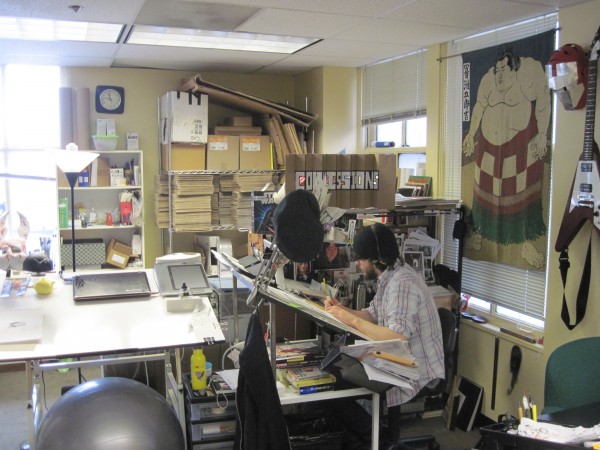
* I enjoyed a visit to Periscope Studio. I always like talking to
Steve Lieber. He's one of those talents-with-broad-creative-shoulders on which the North American comic book industry was built. He told me great stories about
Tex Blaisdell (a former teacher) and
Don Simpson (the subject of his student-era assignment to talk to a working comics-maker), showed me the tons of original art on the studio walls (his Al Williamson, Jeff Parker's Roy Crane, Paul Tobin's panoply of great-looking art, a to-die-for early Jaime Hernandez page) and was a genial host in general.
* I also sat down at Parker's desk for a half hour and finished three Red Hulk scripts and made 85 stupid tweets. You're welcome, comics.
* Seattle was fun. Same city I remember, right down to the rain that felt like being peed on by frost giants.
* I saw my old friend Mrs. Kincade, who revealed to me she's a high school buddy of the artist
Brian Hurtt. Small world. I assured her that
Sixth Gun is well-liked. Seattle still has that cupcake thing going on. A friend of mine tried to describe the appeal of a coffee shop revolving around cupcakes rather than solely coffee, but pretty quickly fell into, "Well, cupcakes are pretty damn great, right?" Yes.
* after a visit to
Fantagraphics, I'm more convinced than ever that hiring co-founder
Mike Catron as an editor was a significant move for them. I wouldn't be surprised to even see a bump-up in production from them in a couple of seasons because of it. If you're a Fanta-geek, it's fun to see how Catron's skill-set works alongside those employed by
Kim Thompson and
Gary Groth. Catron told a great story about wanting an exacto knife the other day and not being able to find one in the production department.
* I'm also pretty sure the hiring policy at Fantagraphics right now favors freakishly outsized giants. It's one thing to show up and not recognize two-thirds of the staff, and to feel they're all 20 years younger than you are; it's another to seriously fear for one's life via death by thrown boulder or being picked up and dropped. I saw
Kristy Valenti catch a ride upstairs by jumping on some guy's pant leg.
* I'd mention that people from Fantagraphics seem to dress better than they did in my day, but
extras from Les Miserables dress better than people at Fantagraphics did in the 1990s.
* I saw some future efforts up at the publisher, including an out-of-nowhere book from one of the 1990s well-regarded, since disappeared, alt-comics talents. The forthcoming
Spain Rodriguez book looks great on the inside and very 1980s-era collection on the outside, which made me laugh. Those stories are a blast. No cartoonist was ever cooler than Spain.
* I was lucky enough to score Xeroxes of legendary unpublished comic book
Albuquerque Ben on the trip. This was a comic done by a guy named Richard P. Butler that contained some of the oddest narrative connections and progressions I've ever seen. I look forward to re-experiencing it.
* the cartoonist David Lasky was described to me late one night as "the
Steve Willis of Seattle." I really liked that, and look forward to
his just-completed Carter Family biography. I missed seing David, and I regret that.
* the cartoonist and comics educator
Greg Stump has a completed book called
Disillusioned Illusions he'd like to place at a literary publisher,
.(JavaScript must be enabled to view this email address)
* I enjoyed the show.
* press registration was easy. I stopped by before lunch and got directions from a security guard -- not people on whom you depend for that sort of thing at many shows. The ECCC folks were certainly hardcore about not letting anyone register on site. I don't know the woman's name that was manning that set of booths, but the way she went from fierce protector of the badges to sweet-smiling "hey, welcome to the show!" hostess killed me.
* it was nice to see the writer
Matt Fraction before he got absorbed in panels and his always lengthy line. I like that
Casanova book that he does, and I hope we get to see the entire cycle of series. We spent the majority of those brief seconds talking about
Jaime Hernandez, of course.
* the
James Stokoe and
Matthew Southworth pages I saw were super, super handsome, each in their own way. I didn't stop to look at a lot of original pages, but those stood out among those I saw. The Stokoe pages are freakishly meticulous and show almost no evidence of mid-course correction. They are kind of amazing things distinct from any story they're telling.
* the writer
Joe Casey told me that he was now anti-story. Also: rhinoceros, umbrella, puddle.
* it was great to see folks waiting in line to talk to Seattle-area artist
Justin Norman, aka "Moritat." That guy's one of my favorite people in comics and started getting mainstream work relatively super-late in his career, so it's good to see him appreciated. It was also good to have brief conversations with other, I-see-them-only-at-cons folk, like
Kelly Sue DeConnick,
David Brothers, and
Gary Sassaman.
* I talked to
John Siuntres of Word Balloon for a few moments on the show floor, aand not for my usual reason of just wanting to listen to his radio-ready voice. I actually wanted to ask him about his having worked for
Bert Sugar, the late boxing writer. I always liked Sugar: he was sort of this outsized version of what one thought all sports reporters were like -- one-third cigar, one-third hat, one-third wisecracks -- which was something you didn't always get to experience in the days before multiple sports cable networks. He told me Sugar was a very nice man.
* the
Robin McConnell panel on creators talking about their influences looks like it could end up right there with the
CBLDF "watch people draw" panels and the San Diego "Quick Draw" tradition as panels that could become dependable mini-franchises. I could have watched something like that all day long.
* a pair of comics-makers talking about influences on panels stuck in my head:
Ellen Forney acknowledging
Michael Dougan (particularly his great books
East Texas and
I Can't Tell You Anything);
Nate Powell talking about the devastating effect
Chester Brown's
I Never Liked You had on him, including a heartfelt, nearly breathtaking description of that sequence up front where young Chester shows his mom a broken egg. (
Mike Allred also spoke in praise of Brown's original comics run on that same panel as Powell.)
*
Larry Reid's panel/lecture on the Northwest's primary contributions to alternative comics was quite entertaining, particularly if one has an appreciation for Reid -- a Seattle cultural icon and current manager of Fantagraphics' retail efforts in
the Georgetown neighborhood.
*
Jim Woodring told a funny anecdote about a
Misfit Lit panel back that included Woodring,
Robert Crumb,
Burne Hogarth and
Paul Mavrides. That's an astonishing line-up of funny, talented talkers. Mavrides apparently broke the creation of comics down into a choice between giving the character he's drawing a bag of money or dropping that character off a cliff. Even 20+ years removed, one can imagine the steam shooting out of Hogarth's ears.
* it was great seeing Woodring, by the way, and a pleasure watching him be engaged with his fans. Woodring along with
Peter Bagge was one of the twin father figures of Seattle cartooning life when I lived there in the 1990s. He's a very present person, and obviously super-smart with the kind of talent that indicates he's touched by God. I'm told his signings went well.
* I know I always say this, but I will never in my entire life understand the costuming impulse. I don't mean that I can't process the logic when it's presented to me: it's not hard to figure out the ways it's fun for people, in ways both innocent and salacious. I just don't fundamentally connect to those specific pleasures. God bless you people for finding something you enjoy and in which other people take significant delight. I only pretend to hate you because, let's face it: you're in the way.
* the costumes people talked to me about were a Silver Surfer/Galactus combo, a Doctor Octopus with injury-to-others potential in his arms, and a lady dressed up as a character from
Orc Stain.
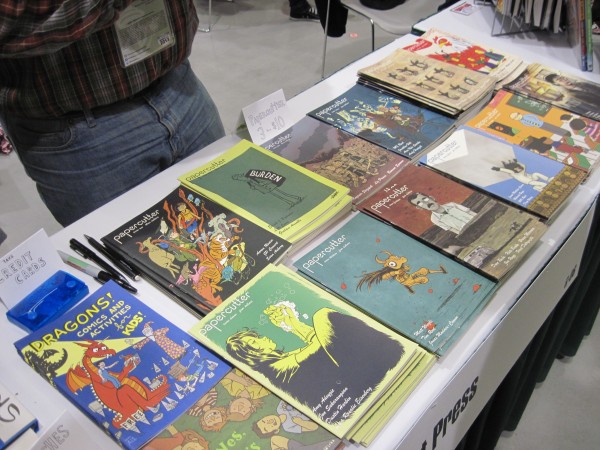
* I was happy to stop by the
Tugboat Press booth, pick up their
Paper Runner freebie and thank them for their
Papercutter anthology. Given millions, I'd try to facilitate a dozen or so comics on the market with those comics' basic look. The 2010 edition with Matt Wiegle's cover is a particularly good one if you ever get the chance. Wiegle's story is genuinely funny and original in a way that will make me look at everything he does from now on.
* speaking of Tugboat Press, I guess they're taking much of 2012 off and will consider a range of publishing options upon their return.
* Saturday seemed to me about 30 percent more crowded than Friday inside the main hall, and about 50 percent more at other points in the venue. Sunday seemed like a 20 percent scaleback from Saturday. I don't know official attendance figures, but I'd be shocked if it wasn't a record-breaker for the event. I was told by
Dennis Culver that they reached capacity at some point on Saturday, that people were stopped from coming in.
*
Ed Brubaker and
Greg Rucka were very good on their panel about crime comics, by which I basically mean they were funny and informative, two things that for me are pretty much the point of listening to comics-makers talk about their work. There was an inordinate amount of time spent of
Gotham Central, although that made plenty of sense given it was a Brubaker/Rucka collaborative effort and it spoke to a couple of the questions where the concerns of superhero comics were used as a contrasting element against similar factors concerning crime books.
* a gentleman named Randy Engle had one of the best retailing set-ups I've ever seen at a show, at least as far as it hitting what I personally like to buy at comic book shows. The key is he had a ton of attractive books at lower grades and then priced those books under $3. I picked up a load of Marvel-era
Jack Kirby all for a total of less than $40.
* although he's not a retailer and has no physical location other than what he sets up at shows, Engle mentioned that he will go to someone's home in the general Seattle area as long as they guarantee they'll spend $200. I have seen the future of comics retailing, and it involves me and my buddies throwing parties whereby we end up buying at least $200 in low-grade Silver Age comic books.
* I know that Ed Brubaker has cool readers because at one point he said something about comics fans generally that might be taken as a negative by those people over-sensitive to such things, but when he looked at the line in front of him and said "not you guys," everyone standing there laughed.
* a number of artists were oohing and aahing over
Kevin Nowlan's presence at the show.
* I'm not sure how to characterize the show more generally, the overall mood. There were a lot of media-type fans there, but more than enough comics fans to keep most creators and most tables happy. In fact, the show seemed to do a singularly good job of shielding the comics folk from the media guests and the gaming stuff. The alternative comics fan ratio seemed pretty small given that there's a reasonably-sized audience for such books up there. There didn't seem to be a big nostalgia audience in terms of the comic book element involved, if that makes any sense -- the pair of panels where I went to watch comics-makers in their late fifties and into their sixties weren't all that well attended. The bigger mainstream panels routinely filled up to overflowing.
* I liked the physical set-up of the
Washington State Convention Center building in terms of the ways programming and the gaming areas were handled: it wasn't difficult to make one's way anywhere (with the possible exception getting to some escalators near the voice-talent autograph lines), there were a number of rooms of various sizes, and each panel had multiple show volunteers in attendance.
* in terms of organizational strategy, I'm still generally down on the policy of letting people in for the next panel hold seats during a current one. It makes the current panel harder to hear even if folks are on their best behavior, and seems like an overall distraction.
* mostly, though, I thought the convention was well-organized and I was particularly impressed by the sheer number of volunteers I saw. No manpower issues, it seems.
* I saw convention organizer Jim Demonakos for five seconds about three hours before the show on Friday. He was nice enough to stop as if he would talk to me if I wanted him to, but I waved that very, very busy man onto his next crisis.
* folks spoke highly of Demonakos all weekend, and not just for his work on the show. Someone mentioned his contributions to a recent comics-category charting effort. I was also told -- I'm not somewhere I can confirm -- that Demonakos apparently bought the old University District Zanadu Comics location, and is quite the Puget Sound retailing force in general. The reason I mention this is that if people believe in the convention organizer it goes a long way towards having a positive overall experience.
* I had a nice breakfast with Robin McConnell, David Brothers and Brandon Graham at one point during the weekend. We talked about a range of artists from Richard Corben to Tom Hart, and I probably overcompensated for my age by gossiping too much. I like that people are becoming bolder about building meaning from comics as a range of artistic expressions that makes personal and private sense as opposed to conforming and/or shoring up an orthodoxy.
* That breakfast was also the first meal I ever had purchased for me by a comics-coverage enterprise not my own. Thank you, Robin.
* one of the things David Brothers mentioned at the breakfast is that he may be writing more frequently on
ComicsAlliance soon, which would be good news for them and for us.
* I'm told
King City moved
a lot of copies over the weekend, which is a good thing. There's a nice price point on the book ($20 for what must be 400 pages), and it's thrillingly drawn. Graham presented me with a drawing at breakfast, which killed me considering the amount of drawing he had on his plate that weekend. Thanks, Brandon.
* there's something sort of awesome about watching so many people you've known for a very long time being moms and dads.
* Eric Reynolds made a great point during that panel that as much as something like Emerald City is a good thing for a city like Seattle, it may be even better news that there's a new, emerging generation of alt-cartoonists in town.
Some members of that group had an art show the night before the convention began, and released a tabloid comic.
* I did end up sneaking out of the convention to a movie (
The Raid) by late Saturday afternoon. It's nice to have your con in a downtown location precisely for such distractions. Also, I've left conventions two hours in before, so transitioning to my comics-related Saturday evening via a bloody action movie I'm not going to be able to see back home isn't a slight on ECCC in any way.
* only in Seattle can someone ask you to meet them "at the Starbucks on 6th and Pine" and you have to look into two different establishments. I am seriously not kidding about this. In general, I hope people accessed
the Victrola establishment right up Pike rather than hit too many of the chains. Seattle's a great city with a variety of individually-directed food and drink businesses, but the area of the convention center is that metropolis' Times Square.
* at least one person indicated to me that the show was much, much busier than the year before. If there were days when people used to visit each other behind their tables and catch a hang while meeting fans and readers, those days seem to be over.
* something I didn't know about the
CBLDF set-up that makes a lot of sense: in a busy time like the one we're in now convention-wise, the material they sell and distribute to raise money for the Fund gets sent from show to show to show.
* Don Rosa's shocking white hair is a vastly undervalued convention visual signifier.
* a sentiment that made me laugh: "never let the guy that made over $1000 at the table that day choose the restaurant."
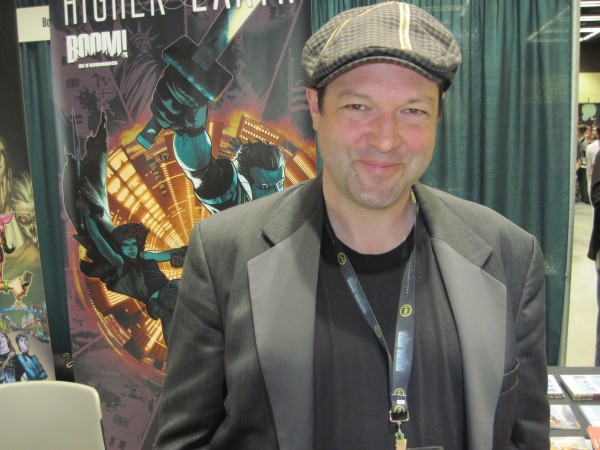
* it was good to see
Shannon Wheeler, and I mean that literally: Shannon had a James Gandolfini-style mega-beard the last few times I saw him. Shannon just sold another cartoon to
The New Yorker, and it was fun to see him light up when talking about the post-pitch cartoonist lunches.
* most of the publishers and creators to whom I spoke did well at the convention, no one reporting deep penetration on any one item in favor of a broader interest in material generally. The audience received major kudos for their general knowledge about comics. The CBLDF told me that they had people joining the Fund having never heard of it before seeing it five seconds earlier.
* so I liked Emerald City Comicon just fine. I think it's a strong mainstream-comics focused comic book show, with enough for the rest of us to spend a half-day to a day wandering around its aisles and sitting in on its panels. I like that the media guests don't seem to dominate, and I like that many of those attending seem to want to buy stuff. I think the show could use a stronger programming track for non-mainstream material and a greater variety of satellite and social efforts in the show's support. But for now: congratulations on their success. I plan on attending future iterations.
* when my group left the show on Sunday, we walked by a few people in rugged-looking clothing having their photos taken. We honestly couldn't decide whether they were
Hunger Games cosplayers or just homeless people.
* I miss you, Seattle.
*****
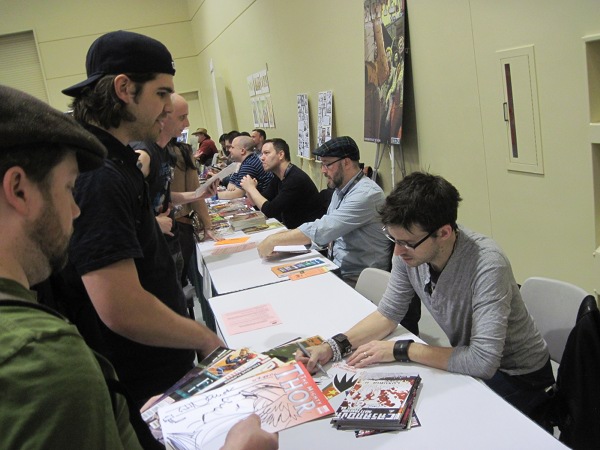
*****
*****
posted 6:00 am PST |
Permalink
Daily Blog Archives
November 2019
October 2019
September 2019
August 2019
July 2019
Full Archives


